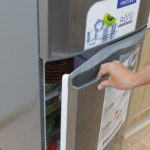The Causes of Odor in Refrigerators
Mold
Mold and bacteria can develop in refrigerators that are not cleaned frequently or if moldy food is left inside for a long time. A crowded refrigerator with limited space for air circulation can also contribute to a moldy and damp environment.
To prevent mold and bacteria growth, it is important to regularly check and remove any moldy food. Additionally, the refrigerator should be cleaned and wiped carefully to ensure food safety and hygiene.
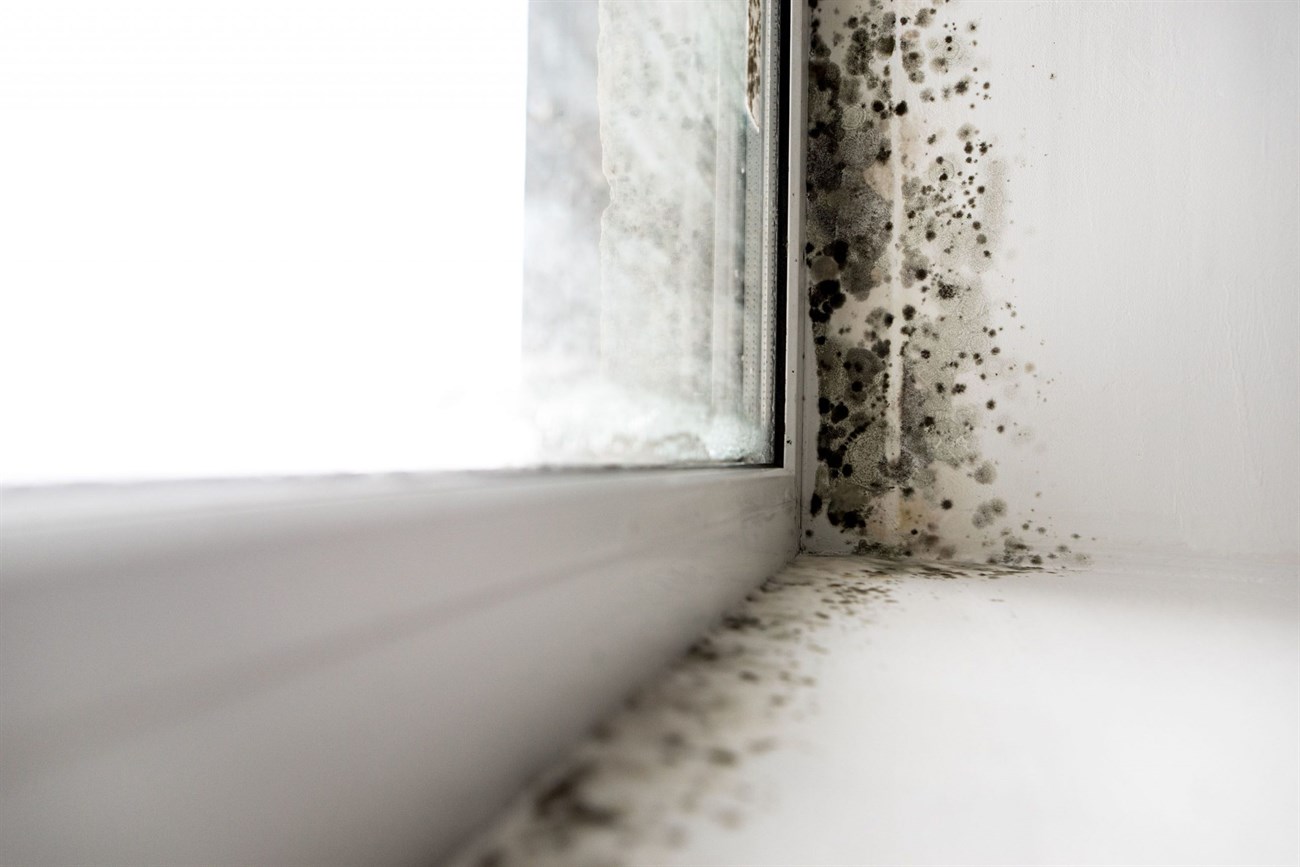
Expired and Fermented Food
Foods that are kept in the refrigerator for too long or have expired can emit an odor that affects the overall smell of the refrigerator. Spoiled foods can also spread bacteria to other fresh foods.
To prevent this, it is important to use up stored food before it spoils and regularly check for and discard any spoiled food. Placing a bowl of baking soda inside the refrigerator can also help eliminate odors.

Foods with Strong Odors
Foods with strong odors, such as fish, meat, shrimp paste, and durian, can cling to the refrigerator’s fan if not properly wrapped. This can cause an unpleasant odor when the refrigerator is opened.
To prevent this, it is recommended to limit storing strong-smelling foods in the refrigerator or to wrap them tightly in multiple layers of plastic bags.

Leaking Liquid
The area beneath the refrigerator can accumulate dust and odors, especially if spilled liquid or improper cleaning has occurred.
To address this issue, it is important to clean any spilled liquids and ensure that the entire refrigerator is cleaned to maintain cleanliness and proper ventilation.
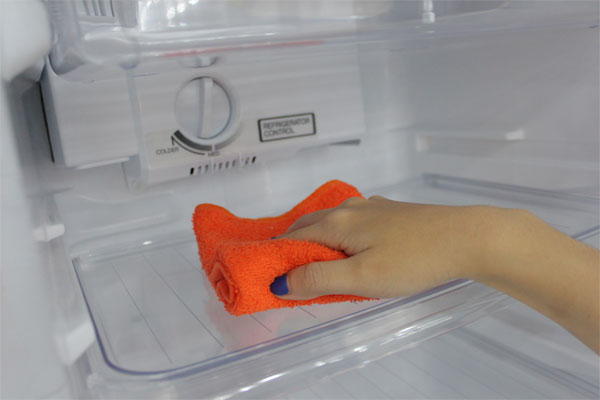
Malfunctioning Parts of the Refrigerator
The water drain pan under the back panel of the refrigerator can develop an odor if not cleaned regularly. Additionally, a malfunctioning compressor can lead to a burnt smell.
Regularly checking and cleaning the water drain pan can prevent the growth of bacteria and mold. If the compressor is suspected to be faulty, it is advisable to seek assistance from a technician.
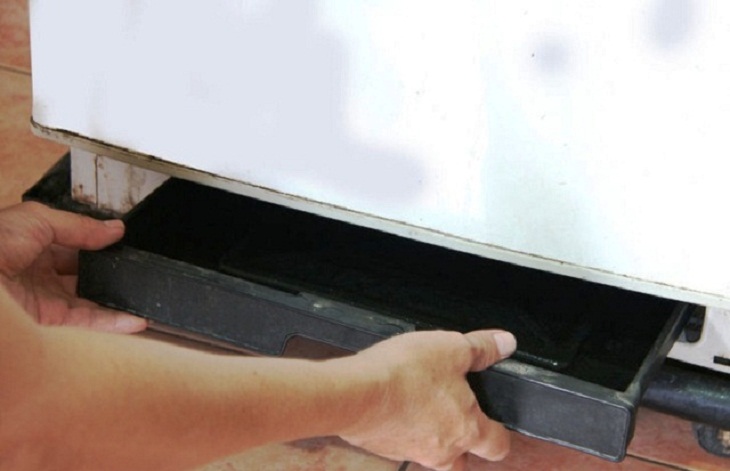
Refrigerator Underperforming or Not Cooling
A smelly refrigerator can be caused by the refrigerator not cooling properly, leading to food spoilage.
To address this issue, a thorough cleaning of the refrigerator is recommended. If technical expertise is lacking, it is advisable to contact a maintenance and repair center.

Refrigerator Door not Closed Tightly
If the refrigerator door is frequently left open or not closed tightly, it can lead to loss of cold air and temperature instability. This can cause food spoilage and emit foul odors.
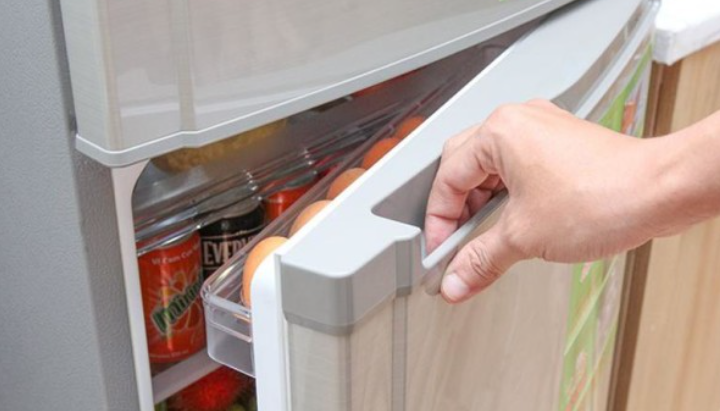
Storing too much Food compared to the Refrigerator Capacity
Overloading the refrigerator with excessive food can obstruct the air circulation and hinder proper cooling, causing food spoilage.
It is advisable to store a moderate amount of food to allow for efficient air circulation and optimal food preservation.

Refrigerator used for a Long Time but not Cleaned
A refrigerator can emit a foul odor if it is not cleaned regularly, allowing dust and bacteria to accumulate.
To prevent this, regular cleaning of the refrigerator is recommended, along with maintenance of the cooling system. This will extend the lifespan of the refrigerator and create a clean environment for food preservation.

The Dangers of a Smelly Refrigerator
- Unpleasant odors from a smelly refrigerator can affect indoor air quality, leading to discomfort and potential health issues.
- Spoiled and moldy foods can spread bacteria and contaminate other foods, posing a risk to the user’s health. Additionally, the drinks stored in the refrigerator may not be as cold as desired.
- Foods stored in a smelly refrigerator are more likely to spoil quickly due to the influence of unpleasant odors.

How to Fix a Smelly Refrigerator
- Promptly remove any spoiled food and ensure the refrigerator is clean and well-maintained.
- Regularly maintain the refrigerator, including thorough cleaning and maintenance of the cooling system, to ensure optimal operation and freshness.
- Additionally, methods such as placing coffee grounds, activated charcoal, or baking soda inside the refrigerator can help eliminate odors and create a fresh environment.

Precautions to Avoid a Smelly Refrigerator
- Before storing food in the refrigerator, it is advisable to place it in containers or ziplock bags to prevent odor mixing.
- Foods with strong odors or leftovers should be stored in sealed containers to prevent their odor from spreading. This is especially important if the refrigerator does not have a filter.
- When storing fresh raw food, such as meat or fish, it is recommended to wrap them in multiple layers to prevent odor and excess salt evaporation.
- Regularly check stored food in the refrigerator to promptly remove any spoiled items and prevent the spread of odors to other foods.

We hope that this information has helped you understand the causes of a smelly refrigerator and provided you with methods to eliminate unpleasant odors. If you have any further questions, please feel free to leave a comment below, and we will be happy to assist you.
Why Is the Refrigerator Smelling Bad and What Are the Consequences?
If you’re experiencing a strange smell coming from your refrigerator, it can be a sign that something may be off. Not only is it a nuisance, but it can also adversely impact the quality of your foods. Here’s an exploration of the various causes of this issue, as well as some strategies to get rid of the smell.
Warning: 7 Potential Risks of Not Shutting Your Fridge Door that Can Result in Energy Loss
Do you ever forget to close your refrigerator door fully? If so, you should consider the consequences of this careless action. Read on to find out the potential problems that could arise when the refrigerator door isn’t shut securely, such as energy waste, a decrease in food freshness, and potential pest invasions. Learn why it’s essential to make sure your fridge door always stays tightly shut!
8 Signs You Should Know That Your Refrigerator is Malfunctioning
If you’ve been using a refrigerator for a while, you may start noticing certain signs that something’s not quite right. Be aware of any frost build-up, loud noises, or lack of cooling – these could all be indications of a broken fridge. Take preventative measures quickly to avoid more serious consequences down the line. Learn more about the tell-tale signs of a faulty refrigerator below.

























